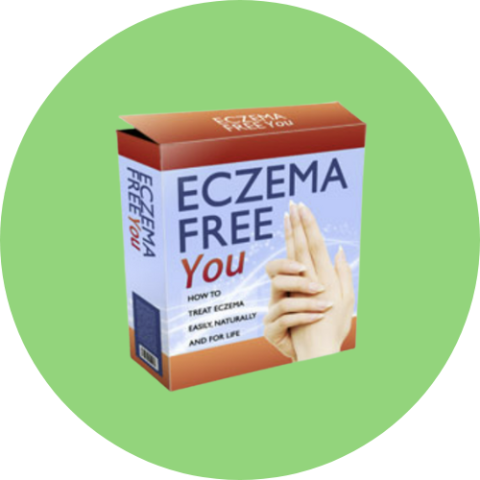What Causes Eczema Flare-ups? 8 Possible Triggers & Treatments
By Vanessa Richards
January 10, 2024 • Fact checked by Dumb Little Man

Do you suffer from eczema? If so, you know that flare-ups can be unpredictable and frustrating.
Figuring out what triggers your eczema is the key to preventing or minimizing flare-ups. Also, what are eczema symptoms? How can you prevent them? Don't worry, we have got you covered!
In this article, we'll identify some of the most common triggers and offer tips on how to avoid them. Stay tuned for helpful advice on managing your eczema!
What Causes Eczema Flare-ups: What is Eczema?
Eczema is a general term for several different types of skin inflammation (dermatitis). Atopic dermatitis, commonly called eczema, is a chronic skin condition that results in dry and itchy skin. The exact cause of eczema is unknown, but it is thought to be associated with an overactive immune system and a genetic predisposition.
Eczema can be a very debilitating condition, making everyday activities difficult and uncomfortable. People with eczema often have a family history of the condition, and it is more common in people of certain ethnicities. There is no cure for eczema, but the goal of treatment is to relieve symptoms and prevent flare-ups.
Triggers of Eczema
There are a number of things that can cause eczema flare-ups. Some of the most common eczema triggers include:
- Dry skin
- Irritating fabrics or detergents
- Allergens like dust mites, pollen, or pet dander
- Extreme temperatures or humidity levels
- Stress and anxiety
- Different environmental and weather conditions
- Cigarette smoke
- Sensitive skin
If you have eczema, it's important to figure out what your triggers are and do your best to avoid them. This can be easier said than done, but it's worth it to try to keep your eczema under control.
Different types of eczema
Eczema is a chronic skin condition that causes the skin to become red, itchy, and inflamed. There are different types of eczema, each with its own set of symptoms.
Atopic dermatitis
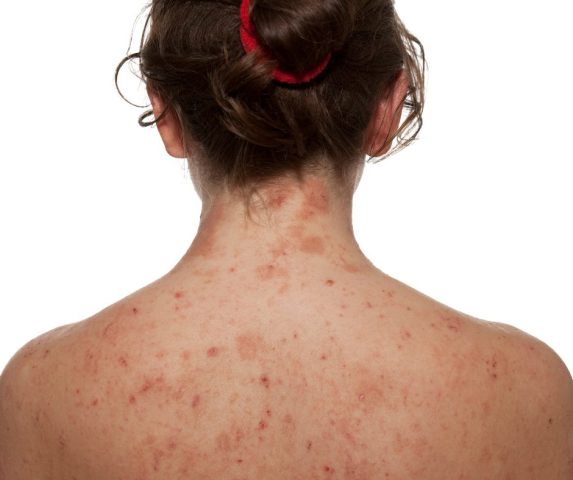
Atopic dermatitis is the most common type of eczema. It typically begins in childhood and often improves with age. Atopic dermatitis is not contagious.
Contact dermatitis
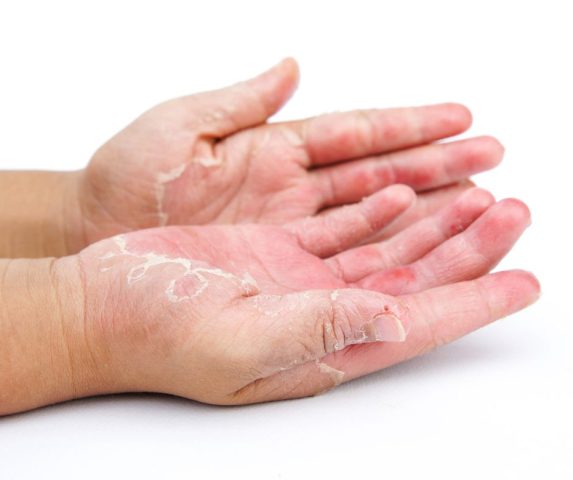
Contact dermatitis occurs when the skin comes into contact with an irritant or allergen. It can be either acute (short-term) or chronic (long-term).
Seborrheic dermatitis
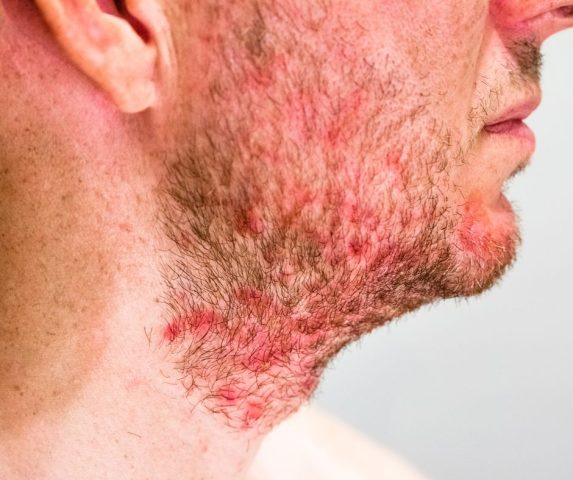
Seborrheic dermatitis is a type of eczema that affects the scalp, face, and chest. It is characterized by scaly, oily, or crusty patches of skin.
Dyshidrotic eczema
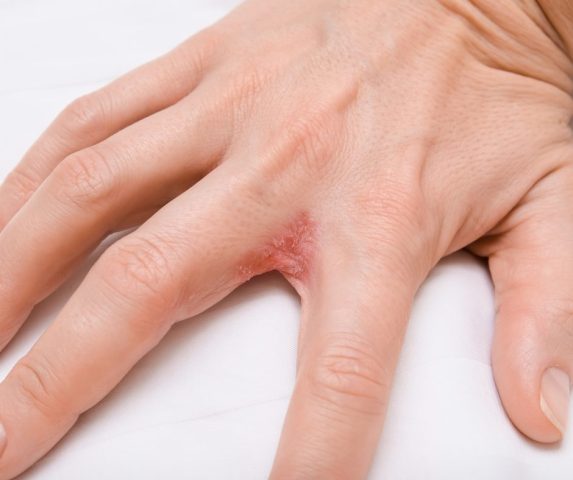
Dyshidrotic eczema affects the hands and feet. It results in tiny blisters that can be extremely itchy. These allergic reactions can result in an itchy rash and skin disease.
Symptoms of eczema
Atopic eczema typically begins in childhood, and most people see improvement as they enter adulthood. However, some people continue to have symptoms into adulthood.
The most common symptom of atopic eczema is itching. The skin may also be red, dry, and cracked. In severe cases, the skin may bleed. Eczema can be a very uncomfortable condition, and it can also lead to secondary infections. The most common symptoms include:
| Symptoms |
|---|
| Dry & Itchy skin |
| Rashes |
| Swelling |
| Redness |
| Crusting |
| Oozing |
| Scaling |
Risk factors for severe eczema flare-ups
There are many different risk factors for eczema, and it is important to be aware of them so that you can take steps to reduce your risk. Some of the most common risk factors include:
Genetics
If you have a family history of eczema, you are more likely to develop the condition yourself. Therefore, eczema outbreaks are common in people with a family history.
Environment
Certain environmental factors, such as exposure to certain chemicals or pollutants, can increase your risk of developing eczema. Besides this, food allergies, skin infection, cold weather, and scratching dry skin are common things that can trigger atopic dermatitis.
Skin type
People with dry or sensitive skin are more prone to developing eczema. It can trigger itchiness and make eczema worse. It is the most common eczema trigger.
Stress
Stress can trigger eczema flare-ups in some people. Do you know emotional stress is a common trigger causing eczema? YES! The National Eczema Association illustrates that stress can result in potential triggers and cold sores.
>>Related Article: How to Get Rid of Scars: Complete Guide 2024
Treating Eczema Flare-Up
Eczema flare-ups can be a real pain, both physically and emotionally. If you're dealing with one right now, here are a few things that may help you find relief.
First, it's important to understand what's causing your flare-up. If you can identify the trigger, you may be able to avoid future flare-ups. Common triggers include stress, allergies, and weather changes.
Once you know what's causing your flare-up, you can take steps to avoid the trigger. If you can't avoid the trigger, there are still things you can do to help minimize the symptoms.
Treatment is based on three essential steps including natural remedies, medications, and supplements.
Natural Remedies
There are many natural remedies that can help to treat eczema.
Evening primrose oil
Evening primrose plant is used to extract this oil and it is used to soothe irritated skin. It is used to treat systemic inflammatory diseases like eczema when taken orally. Gamma-linolenic acid and omega-6 fatty acids found in evening primrose oil may help to reduce inflammation in the body. A lot of people assert that it lessens eczema symptoms without causing any unwanted effects.
Coconut oil
Coconut meat is used to make coconut oil. It is also a natural moisturizer for skin and hair. The National Eczema Association claims that coconut oil's antibacterial properties can lower staph bacteria on the skin, preventing infection. For those who have eczema, this is crucial because inflamed skin areas may crack and ooze, allowing bacteria to enter. Use virgin or cold-pressed coconut oil that has undergone no chemical processing when using it on your skin.
Sunflower oil
Sunflower seeds are used to make sunflower oil. It safeguards the skin's outer layer, which aids in keeping bacteria out and moisture in. In addition to hydrating the skin, sunflower oil also reduces irritation and itching.
Undiluted sunflower oil can be used directly on the skin, ideally right after a shower or bath while the skin is still moist.
Witch hazel
The bark and leaves of the witch hazel plant are used to make the astringent known as witch hazel. It has been used as a topical treatment for skin inflammation for ages. Witch hazel for eczema, however, has received little research.
However, the treatment is frequently used to soothe irritated skin, stop areas from seeping, and ease itching.
Colloidal oatmeal
Finely ground oats are used to make colloidal oatmeal. It soothes and softens irritated skin. You can get colloidal oatmeal as a cream or a powder.
Here’s how to do it:
- Add the powder to lukewarm water for bathing. Now soak yourself in this water for 10 to 15 minutes to soften your skin and reduce itching.
- After you are done bathing pat dry your skin and apply a hypoallergenic moisturizer all over. Make sure that your moisturizer has a high oil content.
Relaxation techniques for treating eczema
There are many different relaxation techniques that can be used to help eczema sufferers. One of the most popular and effective methods is progressive muscle relaxation. This involves tensing and relaxing different muscle groups in the body, starting with the toes and working up to the head. This helps to reduce stress and tension in the muscles, which can trigger eczema flare-ups.
Another relaxation technique that can be used to help eczema is deep breathing. This helps to calm the nervous system and can also help to reduce stress levels.
Both of these relaxation techniques can be used together or on their own to help eczema sufferers. They can be done anywhere, at any time, and do not require any special equipment.
Medications
Medications can be divided into two main categories: topical therapies and systemic therapies.
Topical therapies are applied directly to the skin and include corticosteroids, calcineurin inhibitors, antihistamines, and moisturizers. These topical steroids can eliminate the chances of secondary musculoskeletal and skin diseases while soothing the symptoms.
Systemic therapies are taken by mouth or injected. These over-the-counter medications include corticosteroids, immunosuppressants, and biologics. While there is no cure for eczema, the right treatment can help control the symptoms and prevent flares.
Supplements
Supplementing with certain vitamins and minerals may help to improve the symptoms of eczema. This includes omega-three fatty acids, vitamin D, and probiotics. Speak with a physician before beginning any supplement regimen, as they can help to determine the right dosages for each individual.
Additionally, be sure to purchase supplements from a reputable source, as some products on the market may not contain the ingredients they claim to. With the right approach, supplements can be a helpful addition to an eczema treatment plan.
Digital Program
There are digital guides in the market offering a comprehensive plan in treating different health issues. Here is the most promising one in treating eczema flare ups.
A Permanent Cure For Eczema: Eczema Free You
If you're like most people suffering from eczema, you've tried all sorts of creams and ointments with little to no relief. You may have even given up hope that anything can help ease your chronic itch and inflammation. But there is hope!
Eczema Free You is a comprehensive guidebook that will show you how to finally find relief from your eczema symptoms. You'll learn about the different types of eczema, what causes it, and most importantly, how to treat it effectively.
You will have to download the guide to get tips and knowledge of eczema that could help you to get off this disease. The core reason for eczema is a problem already residing in your body. That is immune system weakness.
So this book will guide you to treat eczema by helping you understand this cause and fighting it within the body. The treatment process covers herbal remedies and natural healing. The patient or the reader has to apply the treatment process. You should be ready to modify your way of living if you want to get benefits from this book.
Shop Eczema Free You Digital Program at Official Website.
>>Related Article: 9 Best Hair, Skin, and Nails Vitamins • Top Product Reviews of 2024
Conclusion
Eczema flare-ups can be caused by a variety of triggers. While you may not be able to avoid all of them, there are some things that you can do to help prevent flare-ups from happening.
By understanding what the triggers are and taking steps to reduce your exposure to them, you can minimize the impact eczema has on your life.
Have you identified any of your personal triggers? What have you done to try and avoid them? Trust me, it is essential to improve the quality of life. If you confused about what to use when it comes to eczema, here's our recommendation.
Eczema Free You is the best eczema guide book available on the market. This book provides detailed information about eczema and how to treat it naturally. Eczema Free You also includes a step-by-step guide on how to get rid of eczema permanently.
Click here to get Eczema Free You Digital Program at a Discounted Price.
>> Related Article: Psoriasis Revolution Review 2024: Does it Really Work?
Eczema Flare-Ups FAQs
What to consider when eczema is flaring up?
When eczema is flaring up, there are a few things to consider in order to make the process as smooth as possible. The first thing to do is to hydrate, both internally and externally. This means drinking plenty of water and using a gentle, unscented moisturizer on the affected area.
It is also important to avoid any potential triggers, such as harsh soaps, perfumes, or certain fabrics. If possible, it is best to take a lukewarm bath with an added cup of Aveeno oatmeal and avoid rubbing the skin dry afterward. Afterward, it is essential to apply the moisturizer while the skin is still damp.
How long do eczema symptoms last?
Symptoms of eczema can appear as early as infancy and tend to worsen with age. The most common symptom is dry, itchy skin that can become cracked, red, and inflamed. In some cases, the skin may also blister or weep.
These symptoms can last for weeks or months at a time, often flaring up in response to triggers like stress, allergies, or changes in temperature or humidity. While there is no cure for eczema, treatments can help to alleviate the symptoms and improve quality of life.
Can eczema come back?
Eczema is a skin condition that can cause the skin to become dry, itchy, and red. It is a chronic condition, which means that it can come and go throughout a person's lifetime. While there is no cure for eczema, there are treatments that can help to lessen its symptoms. In some cases, the condition may go into remission for extended periods of time.
However, it is possible for eczema to come back at any point. For this reason, it is important to be aware of the signs and symptoms of the condition so that you can seek treatment as soon as possible if it does return.
Vanessa Richards
Vanessa is a mom of 3 lovely children and a software geek. Outside of her career as a health and wellness instructor. She enjoys writing and researching on topics such as finance, software, health and culinary.

